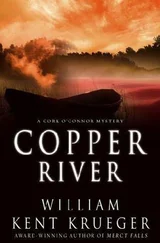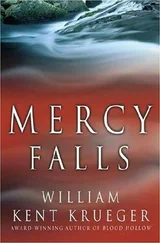William Krueger - Ordinary Grace
Здесь есть возможность читать онлайн «William Krueger - Ordinary Grace» весь текст электронной книги совершенно бесплатно (целиком полную версию без сокращений). В некоторых случаях можно слушать аудио, скачать через торрент в формате fb2 и присутствует краткое содержание. Жанр: Триллер, на английском языке. Описание произведения, (предисловие) а так же отзывы посетителей доступны на портале библиотеки ЛибКат.
- Название:Ordinary Grace
- Автор:
- Жанр:
- Год:неизвестен
- ISBN:нет данных
- Рейтинг книги:4 / 5. Голосов: 1
-
Избранное:Добавить в избранное
- Отзывы:
-
Ваша оценка:
- 80
- 1
- 2
- 3
- 4
- 5
Ordinary Grace: краткое содержание, описание и аннотация
Предлагаем к чтению аннотацию, описание, краткое содержание или предисловие (зависит от того, что написал сам автор книги «Ordinary Grace»). Если вы не нашли необходимую информацию о книге — напишите в комментариях, мы постараемся отыскать её.
Ordinary Grace — читать онлайн бесплатно полную книгу (весь текст) целиком
Ниже представлен текст книги, разбитый по страницам. Система сохранения места последней прочитанной страницы, позволяет с удобством читать онлайн бесплатно книгу «Ordinary Grace», без необходимости каждый раз заново искать на чём Вы остановились. Поставьте закладку, и сможете в любой момент перейти на страницу, на которой закончили чтение.
Интервал:
Закладка:
The visitation seemed to have drained my mother of what strength remained to her and she had not come home afterward. On Saturday morning my father drove to my grandparents’ house and talked with her, probably about Karl Brandt among other things, and when he came back he looked tired and empty but he assured us that we would see our mother at the service. Which was something I wasn’t convinced was necessarily a good idea. Funerals weren’t just about the dead. They were about the dead leaving this world to reside with God, someone Mother wasn’t seeing eye to eye with at the moment, if she ever had, and I couldn’t shake the concern that in the middle of the service she would spring from her pew and find some way to spite him.
People began to gather half an hour before the service began. They drove into the parking lot and got out of their cars and entered the church and stood inside the sanctuary and visited. I was pretty sure what they were talking about-Ariel, Karl, the whole mess. I figured it would be a story people in New Bremen would tell for a hundred years, in the same way they told about the Great Sioux Uprising, and they would use words like skag and faggot and bastard child and they wouldn’t remember at all the truth of who these people were. I watched them from the porch of our house where I sat with Jake. It was just him and me at home. My father had gone in the Packard to get my mother. He wanted us to enter the church together as a family.
Jake had been quiet that day, even quieter than usual, and I wondered if it was because of what had happened to Karl, something I was still trying to make sense of. I was praying that it had been an accident due to the scotch he’d been drinking because if I thought he’d really killed himself then I knew I’d had a hand in it. And Jake too, though I hoped like crazy my brother didn’t see it that way. I should have been the one to stand up to Doyle and refuse to tell him what we’d overheard but I’d knuckled under and Jake had talked and now Karl Brandt was dead. I argued with myself: Karl didn’t have to do what he did. Some people lived with dark secrets all their lives, secrets that threatened to crush them. Something had happened to my father in the war, something terrible, but he’d found the strength to continue on. And me, I was living with the knowledge that I’d let the man who’d probably killed my sister go free, a secret that at moments was almost unbearable, but I’d never think of killing myself. It seemed to me that if a place or situation bothered you, became intolerable, you could find a way to deal with it. Talk to someone maybe or maybe just go somewhere where no one knew you and start a new life. Killing yourself seemed like the worst possible choice.
Out of nowhere Jake said, “There are some things you can’t run from, Frank.”
He was staring into the sun which from our perspective seemed to be hanging directly over the steeple of the church. I thought if he didn’t look away soon he’d blind himself.
“What do you mean?”
“Who you are. You can’t run from that. You can leave everything behind except who you are.”
“What are you talking about?”
“I’ll always stutter. People will always make fun of me. Sometimes I think I should just kill myself.”
“Don’t say that.”
He finally turned from the sun and swung his eyes toward me and his pupils were like dots made with a pencil point. “What do you think it’s like?”
“What do I think what’s like?”
“Dying. Being dead.”
What I thought was that they were two different things. Dead was one thing. But dying, that was another. I said, “I don’t want to think about it.”
“That’s all I’ve been thinking about all day. I can’t stop.”
“You better.”
“It scares me. I wonder if Karl was scared.” Jake held still a moment then looked back into the sun and said, “I wonder if Ariel was scared.”
Which was something I’d managed up to that point not to think about. It was the difference between being dead and dying. Being dead was a thing and not a horrible thing because it was finished and if you believed in God, and I did, then you were probably in a better place. But dying was a terribly human process and could, I knew, be full of pain and suffering and great fear and because I didn’t want to think about it I felt like grabbing Jake and shaking all those awful thoughts out of his head.
The Packard came down Tyler Street and thumped over the tracks and right behind it was my grandfather’s Buick. The two cars pulled into the church lot in an area outlined with yellow tape to reserve the spots for them. My father helped my mother from the car and even at a distance I could tell that if a solid wind blew it would tumble her.
“Come on,” I said with a sigh and stood up.
We entered the church together as my father wished. My mother took his arm and walked ahead and then Jake and I and then my grandparents. Deacon Griswold handed us programs and people broke off their conversations and made way for us. We walked to the first pew up front and filed in and sat down. Ariel’s casket had been laid before the altar rail, flanked with flowers that looked much like those that had accompanied the visitation. Although I’d had no trouble looking at the casket the day before, on that Saturday I did my best to keep my eyes averted. I stared instead at the stained-glass window behind the altar and imagined shooting the panes out with a slingshot. Lorraine Griswold came in from the side door and sat down at the organ. Pastor Stephens entered from the same door and took his seat behind the pulpit. Amelia Klement came up the aisle from where she’d been sitting with her husband and her son and sat alone in the choir section next to the organ. A hush fell over the church and Lorraine began to play, something soft and sad and classical, and I could have looked at the program to see what my father had chosen but I was already distancing myself from the whole experience. All day I’d been thinking that if something became intolerable you could simply remove yourself from it and that’s what I did. I thought about the things that had happened that summer, played them over in my head-sweet Bobby Cole and the dead itinerant and the day I pushed Morris Engdahl into the quarry and Warren Redstone slipping away across the trestle in the rain and riding horses with Ginger French and Karl Brandt plowing his little Triumph into a cottonwood tree-and the result was that I remember almost nothing about the funeral service except that it went on forever. People came to the pulpit and said things-later I learned that they’d shared wonderful memories of Ariel-but I wasn’t present and didn’t hear them. Everyone sang and I suppose I must have sung too because the music, what penetrated, was familiar. I don’t remember a word of what Pastor Stephens said but I had the sense that it was appropriate though dry.
And then it was time to go to the cemetery and I walked out with my family into the swelter and got into the hot Packard and sweated while we waited for Ariel’s casket to be loaded into van der Waal’s hearse and then we followed.
I’d hoped for a kind of miracle that day, hoped for something like the joy that had filled me on the Sunday before when my father had stood and delivered his brief, miraculous sermon. And if not joy then peace at least. But as we entered the gate of the cemetery I felt only grief knifing deep into my spirit. And when I saw the grave I was devastated. Somehow I’d imagined it would be as Gus said, a beautiful box carved from the earth. It was indeed a lesson in geometry, a perfect rectangle with ninety-degree angles and straight sides and rigidly perpendicular walls and a level floor, but it was still only a hole in the ground.
Читать дальшеИнтервал:
Закладка:
Похожие книги на «Ordinary Grace»
Представляем Вашему вниманию похожие книги на «Ordinary Grace» списком для выбора. Мы отобрали схожую по названию и смыслу литературу в надежде предоставить читателям больше вариантов отыскать новые, интересные, ещё непрочитанные произведения.
Обсуждение, отзывы о книге «Ordinary Grace» и просто собственные мнения читателей. Оставьте ваши комментарии, напишите, что Вы думаете о произведении, его смысле или главных героях. Укажите что конкретно понравилось, а что нет, и почему Вы так считаете.












